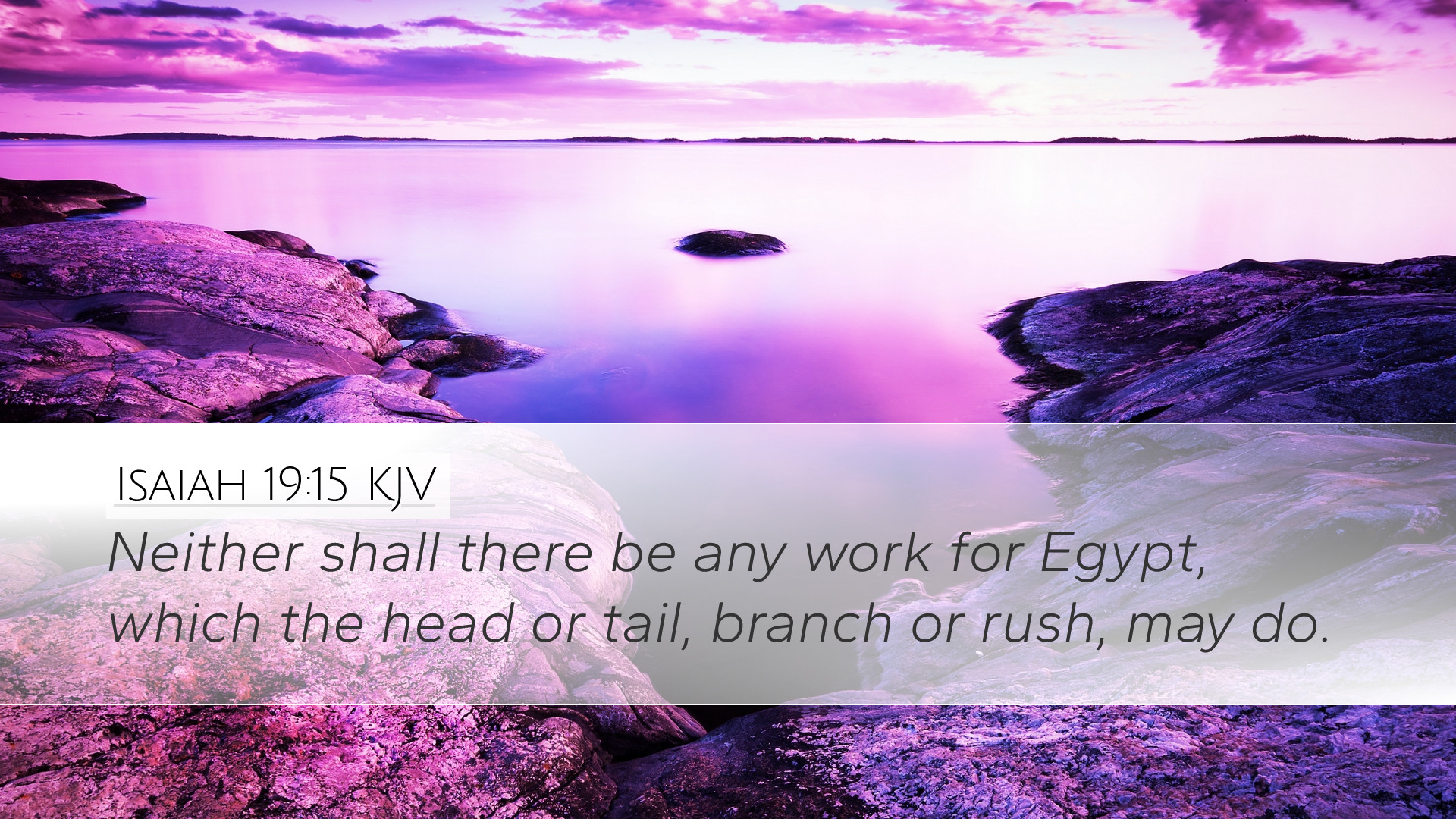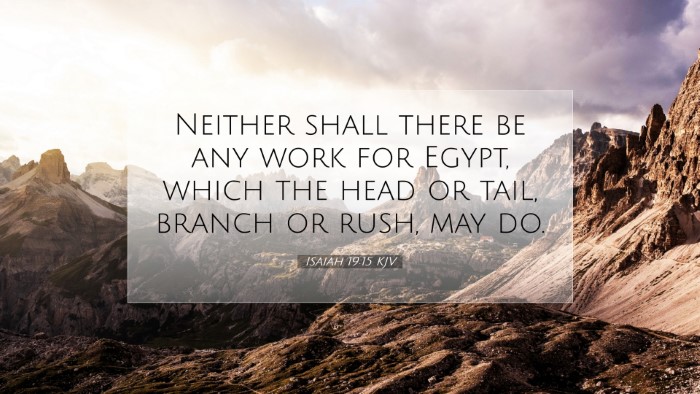Commentary on Isaiah 19:15
Isaiah 19:15 states, "Neither shall there be any work for Egypt, which the head or tail, branch or rush, may do." This verse reflects a prophetic declaration concerning Egypt and its impending judgment, intertwined with theological themes of divine sovereignty, judgment, and redemption. Below is a cumulative commentary derived from esteemed public domain sources including Matthew Henry, Albert Barnes, and Adam Clarke.
Contextual Background
The prophecy of Isaiah concerning Egypt is deeply rooted in the historical and cultural context of the nation during the time of Isaiah. Egypt is depicted not only as a geopolitical entity but also as a symbol of human pride and reliance on human strength apart from God. Isaiah's prophetic vision reveals a God who has dominion over all nations, including Egypt.
Historical Setting
In Isaiah's time, Egypt was a powerful nation, renowned for its wealth, military strength, and influence in the region. However, the prophecy foretells a time when this strength will be rendered futile. The phrase "neither shall there be any work for Egypt" indicates a complete cessation of economic and productive activity, pointing to a divine judgment that leads to chaos and desolation.
Theological Implications
This verse encapsulates key theological insights that are essential for understanding God's purpose and the consequences of national sin.
Divine Sovereignty
Isaiah emphasizes God's absolute sovereignty over the nations. As noted by Matthew Henry, "God can make the strength of the mightiest people of no avail." The divine hand is evident in the rise and fall of nations. Egypt's reliance on its own strength is met with judgment, illustrating that true power resides in God alone.
Judgment Upon Idolatry
Egypt, historically rife with idolatry, serves as a cautionary tale. Albert Barnes remarks on the folly of relying on false gods, noting that when God withdraws His support, nations will find themselves impotent. The verse implicitly critiques the Egyptian gods, whose inability to save their worshippers from judgment demonstrates the futility of idolatry.
The Desolation of Egypt
The reference to "head or tail, branch or rush" signifies the totality of the judgment affecting all levels of society—from the highest leaders to the common people. Adam Clarke explains that this imagery conveys a stark reality: when God's judgment falls, no one, regardless of status, can escape its consequences. The disunity, confusion, and lack of work culminate in a nation in despair.
Applications for Today’s Believers
Understanding Isaiah 19:15 is pertinent to contemporary believers. The themes of divine judgment and reliance on God carry significant implications.
Call to Holiness
The verse calls believers to examine their own lives and the corporate life of the church. Matthew Henry challenges readers to consider the areas where they may also be relying on their own strength or worldly power rather than trusting in God's provision and grace.
Dependence on God
In times of trouble, it is essential for believers to seek God rather than any human solution. Albert Barnes advises that true security does not come from political alliances or material wealth but from a humble reliance on the Creator. The text reminds us that God can swiftly turn the fortunes of nations and individuals.
Warning Against Complacency
The desolation of Egypt serves as a prophetic warning against complacency and pride. Congregations and individuals must remain vigilant, recognizing that judgment can come unexpectedly. Adam Clarke notes that this verse should stir in believers a sense of urgency for repentance and return to sincere worship of God.
Conclusion
Isaiah 19:15 functions as a prophetic declaration with profound implications for both the ancient world and modern readers. The cessation of work for Egypt illustrates the futility of human reliance apart from God—a theme that remains timeless.
For pastors, this text serves as a foundation for preaching on the themes of judgment, reliance on God, and the consequences of sin. Students and theologians can explore the rich historical and theological context, utilizing insights from these public domain commentaries to deepen their understanding of Isaiah's message and its relevance today.


